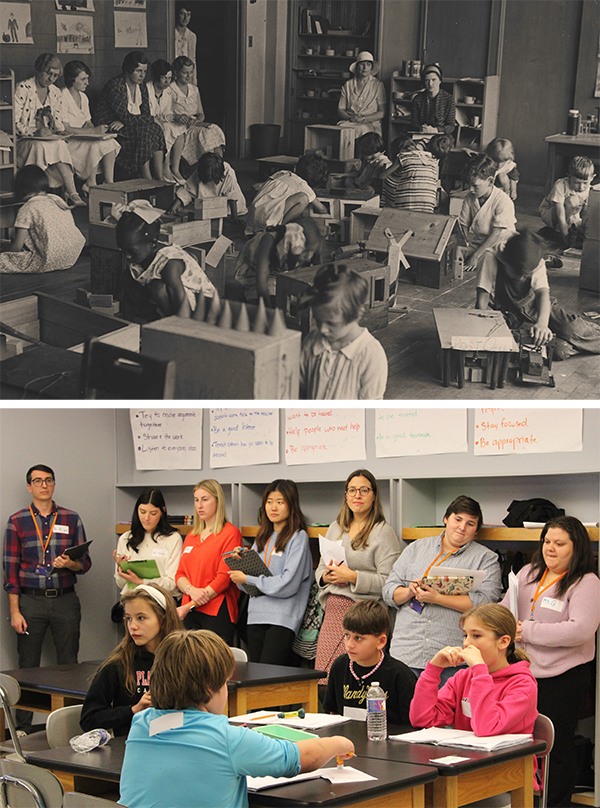2011
601 Tully opens, a center for co-production of culture in Syracuse Near Westside Neighborhood.
2011
SOE signs its first Memorandum of Understanding with East China Normal University in Shanghai, China. The agreement includes academic collaboration on instructional design topics, hosting of ECNU students, and co-hosting of conferences.
2013
A Huntington Hall renovation re-establishes the building’s main entrance on Marshall Street, iron gates are removed, and in May, the Sharon H. Jacquet ’72 Education Commons is dedicated.
2013
SOE receives a $1 million gift from the Himan Brown Charitable Trust to support study abroad.
2014
Led by Professor Beth Myers, InclusiveU launches—the largest and most inclusive program in the US—an initiative of the Taishoff Center that brings students of all ages with intellectual and developmental disabilities who want to experience college life in a fully inclusive setting to Syracuse University.
2014
Interim Dean Joanna O. Masingila tenure begins.
2015
Dean Joanna O. Masingila tenure begins.
2017
The Center for Academic Achievement and Student Development (CAASD) is established, to unify several federally and state-funded student development and success programs.
2018
The Lender Center for Social Justice is opened, with a gift from Marvin ’63 and Helaine Gold Lender ’65, originally co-directed by SOE’s Professor Marcelle Haddix and Professor Kendall Phillips of the College of Visual and Performing Arts.
2019
SOE, the Institute for Veterans and Military Families, and US Army collaborate to bring an online instructional design master’s degree program to the US Army Sergeants Major Academy at Ft. Bliss, CO.
2019
The Syracuse chapter of the AACTE Holmes Scholars Program is created. Orange Holmes Scholars are first- or second- year doctoral students interested in teacher, leader,
or counselor education.
2020
Led by Professor Christy Ashby, the Center on Disability and Inclusion is formed, housing SOE’s disability and inclusion centers and initiatives, including the Taishoff Center for Inclusive Higher Education, InclusiveU, Center on Human Policy, Inclusion and Communication Initiatives, Mid-State Partnership, and Pre-Employment Transition Services.
2021
Interim Dean Kelly Chandler-Olcott tenure begins.
2021
Intelligence++—an interdisciplinary initiative focused on inclusive entrepreneurship, design, and community—is created as a collaboration among InclusiveU, Blackstone LaunchPad at Syracuse Libraries, and College of Visual and Performing Arts School of Design.
2021
A Ben ’84 and Marcia Baldanza ’86 gift to SOE and the Maxwell School of Citizenship and Public Affairs launches the Baldanza Fund for Excellence in Education, which encourages diverse teacher recruitment and retention in Syracuse area schools.
2022
In March 2022, the Center for Experiential Pedagogy and Practice is founded, led by Professor Benjamin Dotger. CEPP engages in research and design initiatives to advance experiential teaching, learning, and professional development for educators and other professionals.
2022
In October 2022, School of Education Assembly voting members agree to de-departmentalize, part of a comprehensive “One School” re-design that focuses on three signature area of scholarship: Inclusive and Antiracist Pedagogy and Practice, Digital Pedagogy and Practice, and Experiential Pedagogy and Practice. This effort is catalyzed with a call to action by the Faculty for Racial Justice and Equity (FREE) collective.
2022
Under Principal Investigator Julia M. White, SOE is awarded a $1.14 million US Department of Education grant for Project IMPRESS (Interdisciplinary Master’s Preparation of Urban and Rural Educators in Special Education and School Counseling) to recruit professionals for high-needs school districts.
2023
Dean Kelly Chandler-Olcott tenure begins.
2023
The Board of Visitors is re-named the SOE Advisory Board.
2023
The Himan Brown Fellowship program becomes the Corinne R. Smith Study Abroad Program Fund, thanks to a gift from Lynn H. Smith, Professor Smith’s husband.
2023
SOE is awarded a $3.7 million grant from the US Department of Education Office of Special Education and Rehabilitative Services to prepare up to 14 doctoral-level special education professors and educational leaders.
2023
SOE joins a $25M USAID-funded project led by not-for-profit development group Creative, focused on developing inclusive and equitable early grade education in Uzbekistan.

 The School of Education was founded in 1906 as the Margaret Olivia Slocum Teachers’ College, with a primary focus on training teachers. Several decades later, with increased student enrollment and an expanded purview, Dean Harry Ganders (1930-1953) led an effort to reframe the organization as the “All-University” School of Education.
The School of Education was founded in 1906 as the Margaret Olivia Slocum Teachers’ College, with a primary focus on training teachers. Several decades later, with increased student enrollment and an expanded purview, Dean Harry Ganders (1930-1953) led an effort to reframe the organization as the “All-University” School of Education.